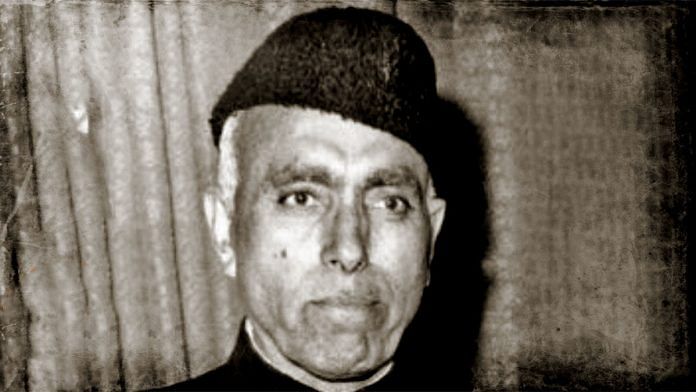Jammu and Kashmir Governor Satya Pal Malik hoisted the tricolour at the Sher-e-Kashmir stadium this Independence Day after the abrogation of Article 370 and bifurcation of the state into two union territories, one with a legislature and one without one.
Ironically, the Lion of Kashmir — Sheikh Abdullah, whom the stadium is named after, is someone who was instrumental in the drafting of Article 370 in the Constituent Assembly (then Article 306A) and even got into intense arguments with Gopalaswami Ayyangar over the provisions of the article. He eventually also fiercely advocated azadi (independent status) for Kashmir, which was shot down and subsequently also led to his imprisonment.
When ThePrint spoke to Professor Noor Ahmed Baba, a professor of political science at Kashmir University in Srinagar, he explained the reason for Sher-e-Kashmir’s popularity: “Abdullah was one of the founders of the freedom movement in Kashmir. More so, he was a commoner and had a personal charisma. He symbolised Kashmiri nationalism.”
On Sheikh Abdulla’s 37th death anniversary, ThePrint examines the lion’s rise and fall, and his contribution to the identity of Jammu & Kashmir.
Lion of the people
Sheikh Abdullah was born on the outskirts of Srinagar in Soura on 5 December 1905. His father, who died 11 days before he was born, was a trader of Kashmiri shawls. Abdullah passed his matriculation from Punjab University and eventually did his MSc. from Aligarh Muslim University. It was at AMU that he was inspired to fight for the rights of the people of Jammu and Kashmir.
Historian Ramachandra Guha has recounted that Mahatma Gandhi once said, “Sheikh Abdullah had done one great thing. He had kept the Hindus, Sikhs and Muslims united in Kashmir and created a situation in which they would wish to live and die together.”
According to Professor Noor Ahmed Baba, Abdullah was instrumental in transforming the Muslim Conference into the National Conference to open it to all sections of society and make it more inclusive. “Abdullah was very devoted to well-being of all Kashmiris,” Professor Baba told ThePrint.
In an interview on 14 April, 1949 to The Scotsman, Abdullah said, “Yes, independence—guaranteed by the United Nations—may be the only solution. But why do you talk of partition? Now you are introducing communalism and applying the two-nation theory to Kashmir—that communalism which we are fighting here. I believe the Poonchis would welcome inclusion in an independent Kashmir; if, however, after its establishment, they chose to secede and join Pakistan, I would raise no objection.we won’t submit to a communal solution. There has never been a religious problem in the Vale of Kashmir. Hindus and Moslems, we are of the same racial origin, we have the same customs, wear the same clothes, speak the same language. In the street, you cannot distinguish between Moslems and Brahman Pandits.”
On 17 March 1948, he took oath as the first Prime Minister of Kashmir.
Despite being instrumental in drafting the provisions of Article 370, Abdullah kept persisting in his fight for the cause of Kashmir’s independence. Constitutional scholar AG Noorani has written that, Sheikh Abdullah’s Kashmiri nationalism clashed with Pandit Jawaharlal Nehru’s Indian nationalism. It was this very clash which led to his imprisonment in 1953 for 11 years on the charge of plotting accession to Pakistan and waging war against India.
But according to Professor Baba, Abdullah would not have been comfortable joining Pakistan and he valued India because he looked at it through Gandhi and Nehru’s prism.
A mixed legacy
Today, many Kashmiris blame their fate on Sheikh Abdullah. Mohammad Sultan, a National Conference activist, has sworn not to visit Sheikh Abdullah’s grave ever again. He said, “I have never abused him before but that man is responsible for our fate. He promised us a better life by choosing to accede with a secular and democratic India but history has proved him wrong,”
Professor Baba explains, “Now after the abrogation of Article 370, he will only be hated further. This is because when the disaffection against India first developed among Kashmiris in the 1990s, it was Abdullah who was blamed.”
Many also claim that it is because of the fact that after he was released from prison in 1975 he gave up the cause of azadi and opted for power and became the Chief Minister of the state.
Today the Sher’s grave on the banks of the Dal lake near the Hazratbal Shrine is surrounded by concertina wire to ensure that it is not vandalised by passersby.
Mohammad Saleem, the chowkidar at the grave for the past 20 years, said, “There are both types of people, some venerate him and some hate him. I have seen people entering the premises (of the mausoleum) barefoot out of veneration and offer fatiha (seek blessings for him).”
Also read: V.V. Giri, the President who signed 2 documents that still shape India’s politics, economy




Such one sided wrte up doesn’t please anybody. The professor is right to some extent when people who liked Sheik, hated him as well. But the point is distorting history by new color will not help. The article never mentioned Raja Hari Singh and the type accession happened in the winter of 1947, when Pakistan supported insurgents were almost at the doors of Srinagar for take over. What was the aim of those insurgents, amply verifiable with genocide minorities in POK Also the very basic thoughts explained by historian Ramachandra Guha on Sheikh Abdulla, as stated Mahatma Gandhi’s thoughts, never supported on the ground reality of exodus of Kashmiri Pandits and others from valley.
Either Mahatma Gandhi was fooled by some on ground situation, or historian distorted the facts or Sheik Abdullah had different intention. Kashmiris need to be supported, they need to be respected and their freedom should not be curtailed. But nothing can stand against the overall interest of the country.
The sentiments expressed in the interview of 14 April, 1949 are a measure of Sheikh Abdullah’s greatness.